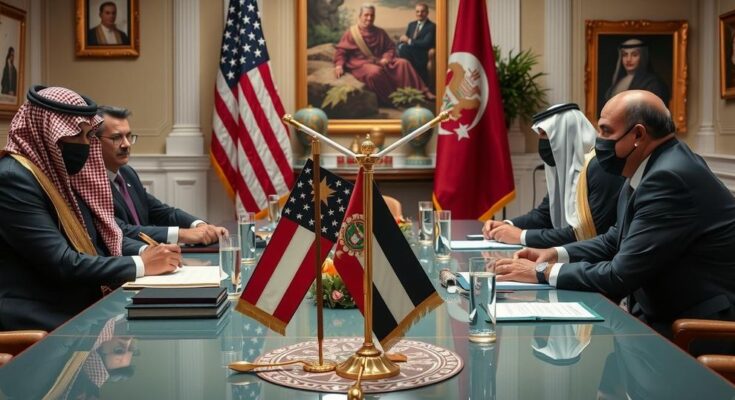Top diplomats from the U.S., Turkiye, the EU, and Arab nations gathered in Jordan to discuss Syria’s political future, emphasizing the need for an inclusive transition to prevent sectarian division. The U.S. is shifting its policy to engage with victorious militant groups such as Hayat Tahrir Al-Sham, while Turkey’s Foreign Minister affirmed the resumption of diplomatic engagements in Damascus. The meeting did not include representatives from Russia and Iran, highlighting regional power dynamics.
High-ranking diplomats from the United States, Turkiye, the European Union, and several Arab nations convened in Aqaba, Jordan, to deliberate on the future of Syria following the recent upheavals affecting President Bashar Assad’s regime. Under the Biden administration, there has been a notable shift in U.S. policy, aimed at engaging with militant factions that have emerged victorious in recent conflicts, most notably Hayat Tahrir Al-Sham (HTS), which has played a pivotal role in seizing control of Damascus.
United States Secretary of State Antony Blinken was dispatched to assess and garner support for Washington’s proposed guiding principles for Syria’s political transition, which emphasize minority rights and an inclusive governance structure. Concurrently, Turkiye, a neighboring country to Syria, has sustained its support for opposition factions seeking to dismantle Assad’s government and has recently indicated its intent to enhance diplomatic presence in Damascus, as stated by Turkish Foreign Minister Hakan Fidan.
The discussions in Aqaba were primarily focused on ensuring that the political transition in Syria does not lead to fragmentation along sectarian lines. Notably, Russia and Iran, both of which have been steadfast backers of the Assad regime, were absent from these negotiations, emphasizing the changing geopolitical alignment surrounding Syria’s future. The colloquium featured participation from senior officials representing Jordan, Saudi Arabia, Iraq, Lebanon, Egypt, the UAE, Bahrain, and Qatar—each of whom emphasized regional cooperation towards a stable resolution in Syria.
The ongoing tensions between Turkiye and the U.S. were apparent, particularly regarding opposition groups in northern Syria. While the SDF, aligned with U.S. interests against Daesh, is viewed by Turkiye as a threat due to its affiliations with the PKK. This dichotomy underscores the complex dynamics at play in assessing Syria’s path forward.
Fidan reiterated Turkiye’s strategic objective to eliminate the YPG presence in Syria, while emphasizing Turkey’s continued commitment to countering Daesh’s resurgence in the region. The meeting served as a critical platform for discussions around improving collaboration among involved nations to achieve a unified approach toward Syria’s multifaceted challenges.
The political landscape in Syria has been tumultuous, particularly following the ousting of President Bashar Assad. The U.S., along with regional powers, is attempting to recalibrate influence and support the formation of a stable, inclusive government. Engagement with various militant groups has become crucial for a successful political transition, while avoiding sectarian division is a primary concern for neighboring countries. The absence of key supporters like Russia and Iran at the recent talks indicates a significant shift in alliances and approaches toward resolving the Syrian conflict.
In conclusion, the diplomatic talks in Aqaba reflect a concerted effort by senior officials from the U.S., Turkiye, the EU, and several Arab nations to navigate the complex Syrian landscape. The focus on an inclusive political process underscores the urgency of creating a stable governance framework that respects the rights of all ethnic and religious groups within Syria. As global powers continue to engage with and influence the ongoing transitions, the outcomes of such meetings will be critical in shaping Syria’s future direction.
Original Source: www.arabnews.com




